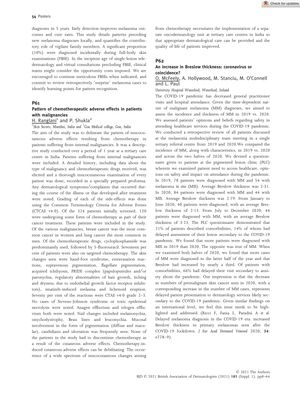P62: An Increase in Breslow Thickness: Coronavirus or Coincidence?
July 2021
in “
British Journal of Dermatology
”

TLDR The pandemic likely caused delays in skin cancer assessments, leading to fewer early diagnoses and thicker melanomas.
The study aimed to assess the impact of the COVID-19 pandemic on the incidence and thickness of malignant melanoma (MM) diagnoses by comparing data from 2019 and 2020 at a single tertiary referral center in Ireland. In 2019, 78 patients were diagnosed with MM and 54 with melanoma in situ (MIS), with an average Breslow thickness of 2.31. In 2020, 84 patients were diagnosed with MM and 44 with MIS, with an average Breslow thickness of 2.79. The average Breslow thickness increased from 2.13 in the first half of 2020 to 3.23 in the second half. A questionnaire revealed that 21% of patients had comorbidities, and 14% delayed assessment due to the pandemic. The study concluded that the decrease in premalignant skin cancer diagnoses and the increase in MM cases in 2020 likely resulted from delayed patient presentations to dermatology services due to the pandemic. This issue, which has been observed internationally, needs to be addressed to prevent further delayed diagnoses and increased Breslow thickness in MM patients.





